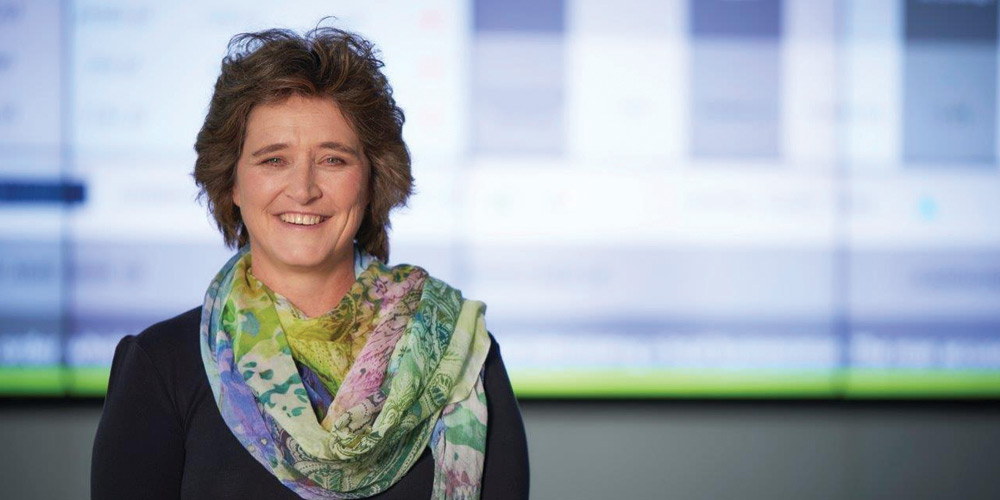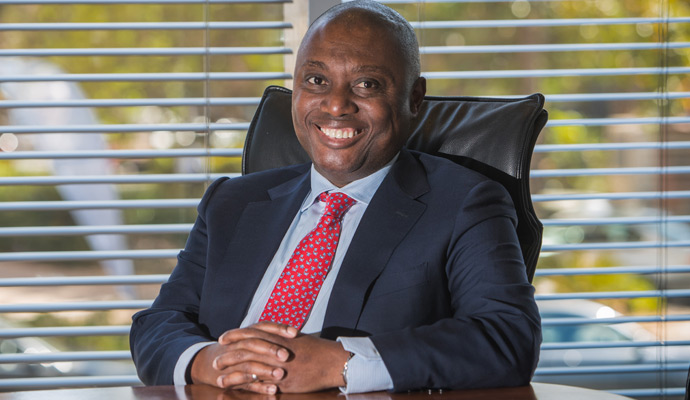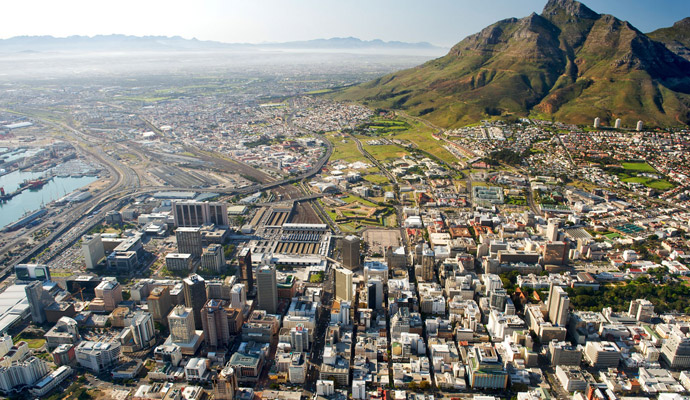Creating a fairer market for capital in South Africa
As head of the Johannesburg Stock Exchange, Nicky Newton-King has pushed companies to look beyond shareholder return and earn the trust of the community.
This interview is part of the Inside the Mind of the CxO series, which explores a wide range of critical decisions faced by chief executives around the world.
The subject of capitalism in South Africa is one as fraught as the country’s history. Most public companies have operated through the apartheid era, so the notion of what role business should and can play in society has always had political overtones. These are clearly not lost on Nicky Newton-King, the outgoing chief executive of the 132-year-old Johannesburg Stock Exchange (JSE), who has led Africa’s largest stock exchange by market capitalization — and 19th largest stock exchange in the world — since 2009, when she became the first female CEO in its history.
During her tenure, which ends October 1, 2019, she championed the importance of business as a socially responsible participant in post-apartheid South Africa, in particular by promoting the idea that business should acknowledge and act on what she terms a “social license” to operate. This emphasizes that a company has a duty beyond shareholders and should involve business leaders building trust with — and obtaining buy-in from — the community in which a company operates.
The year 1994 was pivotal for South Africa and businesses operating in the country, as it marked the end of apartheid and the start of black majority rule. A year earlier, South Africa’s Institute of Directors had asked retired Supreme Court judge Mervyn King (no relation) to lead an effort to define what corporate governance was in a market economy. His first report became known as the King Code; it recommended standards of conduct for boards and directors of listed companies that advocated an integrated approach involving all stakeholders, not just shareholders.
Compliance with the King Code was incorporated into the JSE’s listing requirements in the early post-apartheid years — a pioneering move for a stock exchange. Newton-King took this a step further and oversaw the introduction in 2004 of the Socially Responsible Investment Index — the first such index at any exchange. Companies qualified for inclusion in the index after they were independently evaluated on their adherence to a range of environmental, social, and governance (ESG) principles. These included their approach to black economic empowerment, known as “transformation” in South Africa, where more than 80 percent of the population is black.
This move was put to the test in 2015 when members of the hard-left opposition Economic Freedom Fighters party marched from Johannesburg to the JSE’s headquarters in Sandton, eight miles away. The demonstration stopped at the central bank and other landmarks along the way. The protestors demanded the reallocation of economic resources for the benefit of the majority black population. Newton-King, a former lawyer, says the event showed the importance of the JSE’s voice in business responsibility. She met the leaders of the march, listened to their calls, and changed some of the JSE’s policies as a result.
Overall black ownership in listed shares on the JSE, both individual shareholdings and those held by institutions, grew during Newton-King’s tenure to stand at 23 percent in 2015 (the latest figures available) compared with 21 percent in 2011, to surpass white share ownership, which stood at 22 percent in 2015. The rest was held by foreigners.
Newton-King sat down with strategy+business in London recently to discuss the role of social license in emerging markets, and the wider lessons it has for more developed economies.
S+B: Do you think that companies have “got the program” on their social license to operate, or is there still work to do?
NEWTON-KING: I don’t think people have got the program completely. I think we’ve evolved, and things are evolving. The first social license to operate probably was regarded as a bit philanthropic; the idea that we’ve got to do something, we’ve got to return a bit to society.
In its fully fledged conceptualization, a license to operate recognizes that when you get a legal license, you have an ability to make money by doing your business. But in doing that, how you think about how you run your business becomes the relevant part. If you think that the only responsibility you have is to maximize returns to shareholders, then you’re not really worried about what impact you’re having on society; or on the people who work for you; [or] on your supply chain; or what your responsibilities are, for instance, in relation to achieving the [United Nations’] Sustainable Development Goals.
When you turn this on its head and say, “What if I have a social license to operate that is bigger than my legal license to operate?” it’s no longer about maximizing profitability. A social license to operate is about doing business that properly recognizes you are extracting value from society, and you need to offset that. Paying your taxes, paying the wages on time and sometimes at the bare minimal living wage, is not good enough.
I use a very simple example to make it real for people: paying your suppliers. If you say, “I pay my suppliers contractually on 90 days,” and you don’t think, “My small suppliers have delivered stuff to me on 30 days and have to fund that,” you are missing the fact that by paying after they have delivered, even if that is within your contractual terms, you are affecting their ability to survive. So, what you should say is that your social license to operate means that you should pay them on delivery or within 30 days, because you want to make sure that there are more small suppliers in society so that you can grow the base of the economically active.
It’s thinking differently about how you use your business muscle, [thinking] in a manner that says it’s not about “the winner takes all.” It’s not about becoming the biggest or paying the largest dividend. The good is doing business in a manner that uplifts the socioeconomic environment in which you operate.
S+B: It sounds like the importance of having a social license to operate hasn’t yet been made sufficiently real and practical for companies. Is that true?
NEWTON-KING: Definitely. But it’s also a matter of definition. It’s coming out of this evolution of the space of sustainability, which, as you know, is an alphabet soup of acronyms. One person’s sustainability is another person’s social responsibility program. One man’s SRI [socially responsible investment] is another woman’s ESG. People talk as if they mean the same thing. Sometimes they mean completely different things.
I think it fundamentally challenges capitalism. People sometimes talk about it as conscious capitalism. It’s about recalibrating what we think is acceptable, recalibrating how we run business. And we as a capitalist society — and it’s the same for the ecosystem in South Africa — celebrate the winner takes all; we celebrate the people who have the largest salaries. But we don’t actually stop and say, “Is that good?”
S+B: In South Africa, there’s a real imperative to get economic growth going, and an imperative too in terms of black empowerment in the corporate space. Where does having a social license to operate fit into all of that?
NEWTON-KING: Let’s start with the premise that says, “We need to build infrastructure in order to start building growth.” Taking a purist capitalist view of this, I’d say I must actually price that infrastructure program so that I maximize my profit — that would include hiring people at the lowest possible wages. A more responsible person would say, “You know, I can price this more responsibly and can still make enough money, pay good wages, and [deliver] a decent dividend to my shareholders.” You could say that capitalism does not recognize that sort of intervention as necessary. Or you could recognize that our economy needs to transform and develop opportunities for more people, so you could consider how you might change your hiring practices to achieve this. It’s just a more calibrated way of looking at how you unpack what your core responsibilities are as a business.
S+B: Is it then the case that social license to operate becomes more important in emerging economies because by applying it, you can address things that in developed economies we aren’t addressing — such as helping a supplier ecosystem grow, as in your example?
NEWTON-KING: Yes. We can, and we have to do that because government doesn’t have the financial wherewithal to address some things. Business [in South Africa] is a more immediate presence to most people than the state. Your interaction with the economy is with business. Everything we do impacts people. Business can make a big difference. And now there’s an additional urgency because the excesses of capitalism will eventually cause the poor to rise up and say, “This is not going to be accepted anymore.” This is more real in developing economies, but I would say that that urgency actually is there in Western economies too — it is perhaps just not recognized for what it is.
In South Africa, there’s less a fear of pitchforks and more of a recognition that there is an opportunity to make a difference. And that, for me, is exciting.
S+B: To what extent is the JSE helping companies understand how a social license operates?
NEWTON-KING: This comes up on almost every panel I speak at in South Africa. In South Africa, the concept that you have a duty to stakeholders rather than shareholders is well established and expressed in the King Code. That’s why you see the social and ethics committees in South Africa being such an important part of corporate governance. But even then, we have a way to go before every company crystallizes for itself what its social license to operate is. This is why we take the opportunity at many of our public engagements to unpack the concept of a social license.
S+B: How concerned are you about the future of capitalism?
NEWTON-KING: I do worry tremendously that pure capitalism does not pay enough attention to the impact of business on the economically marginalized, on society, and on the environment. By way of example: In 2015, Julius Malema [leader of the far-left Economic Freedom Fighters party] marched to the JSE, with about 40,000 of his supporters. They had walked all day to hand over a memorandum and ended up congregated in the street outside the JSE. These were largely young, unemployed people. When they arrived, they were shouting aggressive anti-capitalist slogans. Forty thousand people don’t just take a day off work. They had no work to take a day off from. So, you’ve got to listen.
They had 17 demands, and the first one was that employees should own 51 percent of every company. You can disagree with the pitch, but you can’t disagree with the concept of broad-based ownership. Another was: We want all technical training colleges supported by business. You can disagree with business supporting technical training colleges, but you can’t disagree with business supporting continuing education and at the appropriate level.
S+B: So how did you respond in that moment, and thereafter at the JSE?
NEWTON-KING: I walked down with one of my colleagues and climbed up to a flatbed truck from where Malema and his colleagues were addressing the people who had marched all day with them. I stood and listened to their demands, and he offered me the opportunity to respond. I responded in a few words to recognize that what the crowd were doing was to get their voices heard, and so I wanted to respect that. Malema then asked his colleagues to disperse peacefully.
Business can make a big difference. Now there’s an additional urgency because the excesses of capitalism will eventually cause the poor to rise up and say: ‘This is not going to be accepted anymore.’”
It was a seminal moment that cemented to me the importance of the JSE’s voice in urging business to engage in the national agenda; that you can’t simply be a passive bystander or worry only about things that directly affect you or your legal license to operate. No one had expected that march, that moment, to be as important as it was. The result was that we sent the memorandum with the 17 demands to all our listed companies, and the best of them started to use them to analyze how they were doing themselves on these measures. How do you share the upside of your profitability? Are you doing something more reasonable for your staff?
At the JSE, one concrete outcome was that we issued JSE shares to each staff member for the first time, using a share of the top end of the executive bonus pool to do so. We also created a tertiary education support scheme for employees’ children. My point is that if you don’t listen, and if you have a state that is not capable of fully funding development, then you have no sustainability as a country, and therefore no sustainability as a business.
S+B: How did you come to be the first stock exchange to have a socially responsible index?
NEWTON-KING: The FTSE [Financial Times Stock Exchange] had “FTSE 4 Good,” which was more an ethical index than a sustainability index from the very beginning. When South Africa hosted the Earth Summit 17 years ago in Johannesburg, that created an opportunity for people to discuss how to create a sustainability index here that [could become] an aspirational benchmark for companies to try to get into. [In May 2004], the JSE launched the first Socially Responsible Investment Index [which was replaced in 2015 by the FTSE/JSE Responsible Investment Index Series]. We deliberately included mining companies — an extractive industry — and alcohol and tobacco companies, because these types of businesses are an important aspect of our economy. That said, in doing business, those companies have a far higher burden to carry before one can say they are behaving in a socially responsible manner, and the SRI Index rules accordingly set higher bars for those types of companies before they could be included in the index. In the early days, we found that the buy side, the investors, never bothered asking questions about the long-term sustainability of a company, its environmental practices, or its working conditions. But that is definitely changing, and now you’re starting to see the asset managers globally really start to care about this.
I spent years talking to our peer exchanges globally about the need to encourage companies to look at their long-term sustainability, and their answer was to never get into the space because it could mean judging their clients — the listed companies. Now the other exchanges are all scrambling to be in this space. It’s quite nice to have led in this way.
S+B: Where do you see the South African economy heading?
NEWTON-KING: South Africa is delicately balanced at the moment. We have deep socioeconomic issues exacerbated by low growth and intractable issues in our state-owned sector, but we have a sophisticated financial-services environment, good infrastructure, a highly regarded judiciary and reserve bank, and skilled private-sector management. I think there is growth potential. Top South African companies are finding ways to move ahead, although in many cases far more slowly than they would like. If government made some clear decisions aimed at unlocking impediments to growth, the rate of growth could pick up dramatically.




